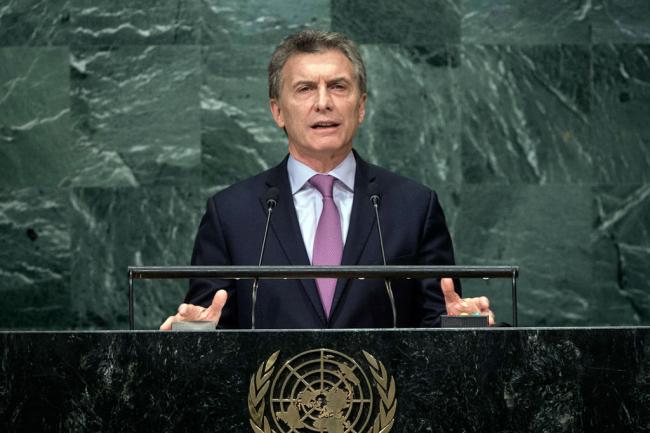
At UN Assembly, South American leaders spotlight efforts to tackle corruption, drug trafficking
He also noted that his country is working to promote greater unification among citizens by strengthening the country’s political leadership. While Argentina embarked on a new path to reinforcing both its economy and its relationship with neighbouring countries, as well as multilateral institutions, it was evident that it could not achieve any of those goals on its own alone.
“While Argentina must seek help from its neighbours, the dire economic situation in Latin America is a harsh reality, he said. Global trade has declined, punishing those who had the least. However, there has been progress in the Latin America and Caribbean region.
Further, important strides had been taken, including the normalization of relations between Cuba and the United States, and the peace agreement between the Government of Colombia and the Revolutionary Armed Forces of Colombia-People’s Army (FARC-EP). Additionally, the establishment of a peace corridor in the region would further contribute to prosperity and security.
The challenges facing the global community are “not exclusive to countries or regions,” Marci stressed, adding that “we must think globally and act locally.” Climate change is the largest challenge facing humankind. Argentina has therefore focused its energy production heavily on solar, wind and biomass generation, in addition to having been one of the first countries to ratifying the Paris Agreement. Other critical challenges facing the international community were the refugee crisis and global terrorism, he noted.
Argentina was committed to receiving more refugees from Syria and neighbouring countries, and to supporting their integration into Argentinian society, President Marci continued. “There is a part of the world in every corner of my country,” he pointed out. While the world is trending towards greater fragmentation, the global community must work together to rebuild networks and lay bridges.
As a country that had itself experienced terrorism in 1992 and 1994, Argentina asked the international community for assistance in bringing clarity to those past events. The rise of global terrorism proved the need to promote development both inside and outside national boundaries, he said, adding that “development does not end at the border.”
Also addressing the general debate, Pedro Pablo Kuczynski Godard, President of Peru, said his country’s public policies incorporated the 2030 Agenda, including ensuring access to water, education and health care for all Peruvians. Such policies would drastically reduce poverty. His Government has also waged an all-out battle against corruption and drug trafficking, and is working to guarantee water and sewage access for 10 million people, almost a third of the country’s population. He pledged a significant investment for the Amazonian and non-urban areas and to implement systems for rain water collection.
In that regard, integration and collaboration with the UN is a top priority, he emphasized, noting the success of a recent top-level meeting on water he had just participated in. Peru is particularly vulnerable to the effects of climate change, especially with the melting of its glaciers in its mountains. His Government has a clear vision of the new challengers and responsibilities that it must grapple with, and it welcomed partnerships with other neighbouring countries to tackle the many challenges of development.
The Peruvian President said fundamental freedoms and the right to participate freely in political life, along with the checks and balances of power, are critical pillars of Government, adding that he also respects the principle of non-interference in international law.
He went on to note concern for the critical political and economic concerns that currently faced all of Latin America. In Venezuela, social and political instability must be tackled by an internal, political dialogue in the context of full respect of the national Constitution. His country would stand by to assist “our Venezuelan friends” in any way to bring about a resolution. In addition, he welcomed the recent peace agreement in Colombia.
The Government in Peru is also working towards modernization in line with the UN goals and efforts. “We live in different parts of the world and are experiencing a loss of confidence,” he said, emphasizing that the unprecedented wave of refugees must be dealt with humanely. “We are betting on a creation of South America and Latin America as a peaceful bridge,” he added.
UN Photo/Kim Haughton
Source: www.justearthnews.com
Support Our Journalism
We cannot do without you.. your contribution supports unbiased journalism
IBNS is not driven by any ism- not wokeism, not racism, not skewed secularism, not hyper right-wing or left liberal ideals, nor by any hardline religious beliefs or hyper nationalism. We want to serve you good old objective news, as they are. We do not judge or preach. We let people decide for themselves. We only try to present factual and well-sourced news.







